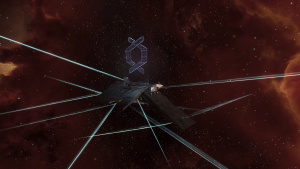This page is a work in progress.
Notes: There is something here
If this article or section has not been edited in several days, please remove this template.

Lanngisi
The trail begins at Project Discovery Phase One Monument in Lanngisi next to Lanngisi III - Moon 2 - Sisters of EVE Bureau.
| Landmark info |
|---|
| In YC118, the Sisters of EVE launched the Project Discovery citizen science platform to the capsuleer community through the GalNet.
Beginning on YC118.03.09, Project Discovery's Phase One work was aimed at achieving a comprehensive categorization and analysis of tissue samples acquired from the Drifters since their emergence in early YC117. Led by Professor Emma Lundberg, Chief Scientist for the SOE advanced research division, Project Discovery Phase One was particularly successful in mapping out a comprehensive protein atlas from the Drifter tissue samples collected and analyzed during the term of the project. Project Discovery Phase One came to an end on YC119.07.11, after 16 months of highly successful work. Project Discovery Phase Two is a new Exoplanets Hunting Program and is being operated under the guidance of CONCORD's Chief of Deep Space Research, Professor Michel Mayor. Please query the Phase One Monument's database for records of those capsuleers who were elite research contributors to Project Discovery's tissue analysis work. --- Technical Note: there appears to be an open Entosis Link port on this structure. |
Entosing the structure will give one item per cycle.
| Project Discovery Phase One Elite 5K |
|---|
| This record of research achievement marks those supremely elite capsuleers who achieved rank 5,000 and above in Project Discovery Phase One's tissue analysis citizen science program.
Those few capsuleers who achieved this are: Ristari Mariones Moliko Vlad Rockfire |
| Project Discovery Phase One Elite 2K |
|---|
| This record of research achievement marks those highly elite capsuleers who achieved between rank 2,000 and 5,000 in Project Discovery Phase One's tissue analysis citizen science program.
Those few capsuleers who achieved this are: Barsuk Hromoi gupi gup MIXA-1984- xXx Airiana Nolen Telos Sui Doom EL PokoLoko TeamGreen Daemon Bequingnolle kala Naari |
| Project Discovery Phase One Elite 1K |
|---|
| This record of research achievement marks those elite capsuleers who achieved between rank 1,000 and 2,000 in Project Discovery Phase One's tissue analysis citizen science program.
Those few capsuleers who achieved this are: King Currency Futoshi Ishii aeouiy Loreleen Maxy Solette Vit Uisen Ivan Vandopolus Nemo deBlanc Rouskach Haginen Wylex Cross Jimmy Thrace Serg And Fix Lag's Fianna MacConnor Trent Liandri Dezmand Nolen Sum Susam Asgiliot Ivanov Danny Chen Azotha Storm Mena Khanid Ardret Livetron AJIEKC Pride Lain Deudigren Tau Scorpii vitek 666 Isnome Alexey Strategov KFX415 Benelos Daams Ivan Puchtek Azanart Rin |
| Project Discovery DNA Reference (Minmatar) |
|---|
| This is a reference set of genetic data pertaining to the Minmatar bloodlines.
This data item bears the designation: MINMATAR // TGA AAT // 1180309 // 1190710 |
| Project Discovery DNA Reference (Gallente) |
|---|
| This is a reference set of genetic data pertaining to the Gallente bloodlines.
This data item bears the designation: GALLENTE // AAA AAA // 1180309 // 1190710 |
| Project Discovery DNA Reference (Amarr) |
|---|
| This is a reference set of genetic data pertaining to the Amarr bloodlines.
This data item bears the designation: AMARR // ATT GAA // 1180309 // 1190710 |
| Project Discovery DNA Reference (Caldari) |
|---|
| This is a reference set of genetic data pertaining to the Amarr bloodlines.
This data item bears the designation: CALDARI // AAT GCT // 1180309 // 1190710 |
| Project Discovery DNA Reference (Jove) |
|---|
| This is a reference set of genetic data pertaining to the Amarr bloodlines.
This data item bears the designation: JOVE // GCT ATG // 1180309 // 1190710 |
Ienakkamon
In Ienakkamon your target is The Solitaire. This Ragnarok-class titan has been sitting here for years and now with help of entosis link you are finally able to shed some light on this mysterious derelict.
After cycling entosis link on the wreck you get either junk like "Garbage" or "Fedo". Eventually you will get a "Recovered Navigation Telemetry" that will guide you to somewhere.
| Solitaire |
|---|
| A ghost ship of enormous proportions, this Ragnarok-class Titan should be at the core of a Minmatar strike force or planetary defense, yet here it floats in silence. Its hull is airtight, yet all useful technology has been meticulously stripped from it, including weapons systems, propulsion, and electronics. There is no trace of its crew, despite all of its escape pods being present. |
The navigation telemetry reads:
This recovered data stream is incomplete but appears to be part of a navigation telemetry dataset. Perhaps something can be made of it with a bit of ingenuity.
...#=!!!EF///S0.1//0.3//0.2//0.4//0.4//0.6//R0.7//0.7//0.5//0.6//0.6//0.8//0.9//R0.7//0.7//0.8//R0.5//0.6//0.9//1.0//R0.9//0.6//0.7//R0.7//0.7//0.7//D0.7///D-RE!!!=#...
| Possible Route: |
|---|
|
???
Apparently you can find the location for the other materials in the "code" from the racial DNA... like it's a scrambled system name. And it's not in high-sec?
System: Ienakkamon
| Recovered Radioactive Materials |
|---|
| This mildly radioactive material was recovered from a concealed laboratory compartment with the aid of novel scanning methods and exhibits some unusual properties. It could be useful in a controlled mutagenic process. |
| Biomechanical Interface Data |
|---|
| This recovered data appears to provide a framework for a novel biomechanical interface involving mutagenic adaptation of disparate sets of genetic data to establish a neural lace using fine control of nanites guided by the user's own genetic structure. |
